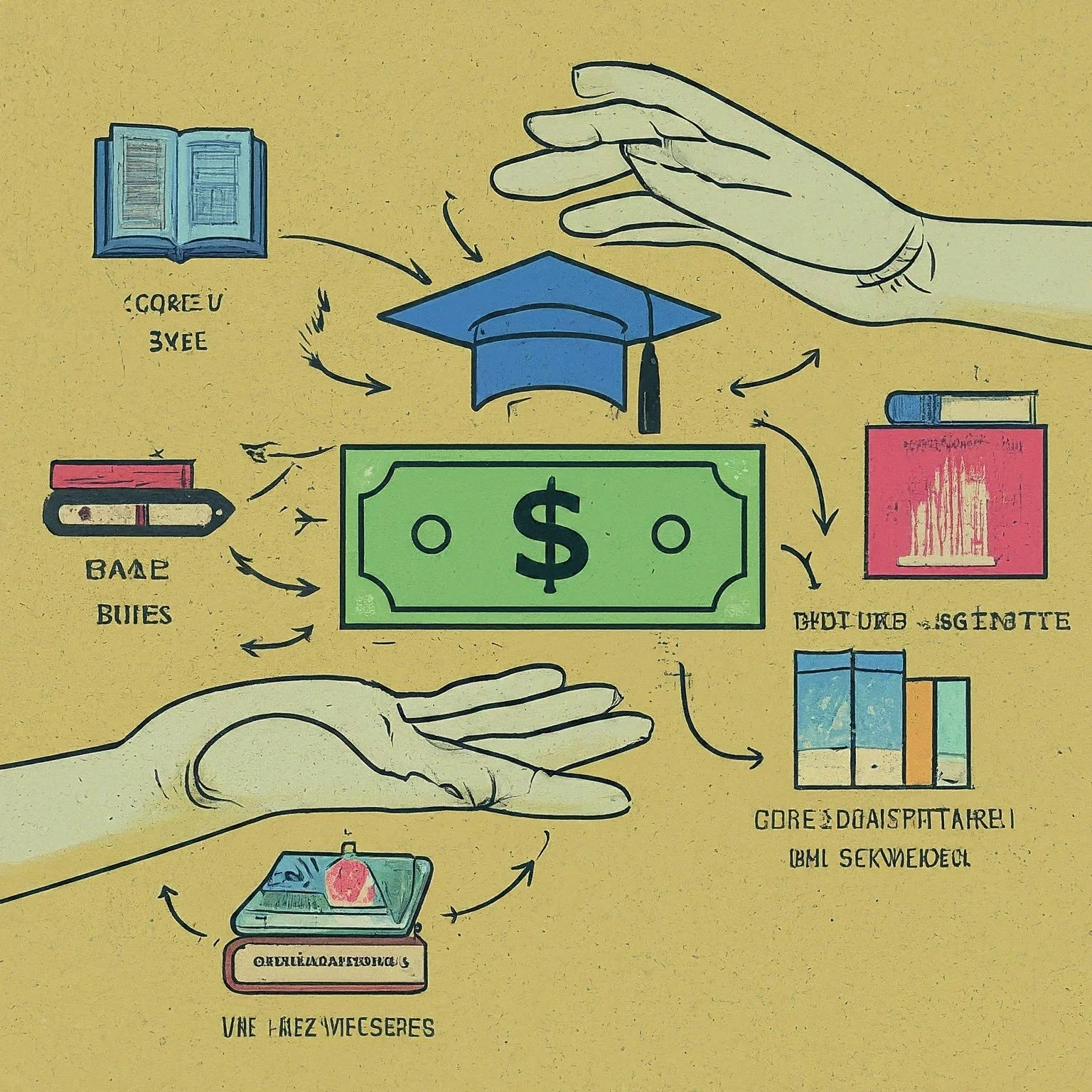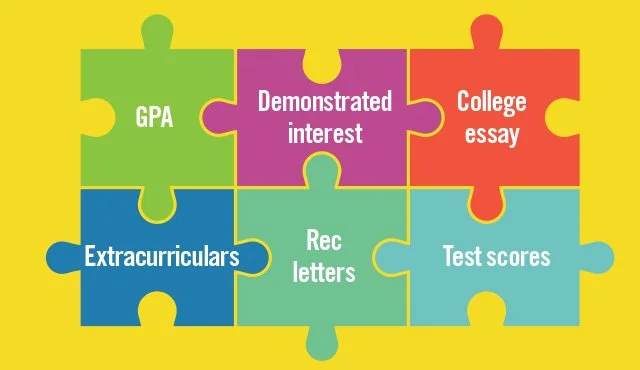If you ever want honest-to-goodness advice about paying for college, ask a parent who’s already been through it. They are full of valuable information that can significantly impact your student’s future— and they’re usually more than happy to share their wisdom.
Does major matter? What every HS student should know.
Students and parents have many questions about the role of major choice in the college admissions process. While we believe there’s plenty of room for changing your mind and pursuing a range of interests in college, there’s something to be said for thinking about majors of interest early and often.
Read on for what we want every high school student and parent to know about high school majors & why this is something to think about sooner than later –
Navigating the Shifting Tides: Key Trends in College Admissions for 2024 and Beyond
The past year continued to witness significant shifts impacting nearly every facet of the college admissions landscape, thereby influencing the lives of aspiring college-bound students. From surging application numbers to dwindling acceptance rates, updates to test-optional policies, and the reshaping of affirmative action, these changes have left an indelible mark on the admissions process.
High School Students Think They Are Ready for College. But They Aren’t
At last count, 62 percent of 2022 high school graduates enrolled in either a two- or four-year college immediately after graduation. But students’ college readiness has reached historic lows, according to several metrics—including the lowest scores in 30 years on the ACT and declining scores on the SAT, the two primary standardized tests used for college admissions. And yet, more than 4 in 5 high school seniors report feeling “very” or “mostly” academically prepared for college, according to a 2023 ACT nationwide survey.
They’re not, say experts.
Get Scholarship Help With These Basics and Tips
College is expensive, but before you take out any loans, find out if you qualify for awards and scholarships. You might find scholarships at the school, local, state, and/or national levels.
By following a few tips—such as looking for scholarships everywhere, understanding their criteria, and staying organized—you could be awarded thousands of dollars for school. Though there’s no guarantee you’ll be awarded any money, the effort may be worth it if you’re willing to put in the time.
11 Colleges Where Early Applicants Gain an Edge
Early acceptance rates at these institutions showed a significant advantage over regular decision rates, according to U.S. News data. Though crafting a standout college application can be a time-consuming and stressful process, submitting an application in the fall, well before the typical winter deadline for regular admissions, is possible.Read on to find out more.
5 Tips for AP Course Success
Going To College Pays, But Elite Colleges Pay Even More
he benefits of a four-year degree are substantial and solid. Getting a college diploma will likely be the best investment anyone ever makes.
Not to brag too much, but some of us have been saying this for a long, long time.
But there’s more to the simple value of a college degree, undeniable as that is. That’s because finishing school matters, but where you finish school matters even more.
7 THINGS TO DO THE SUMMER BEFORE SENIOR YEAR
You just finished your junior year, and you are on top of the world. As the seniors prepare for college in a flurry of stress and excitement, you put your feet up, your shades on, and relax. You’re about to be the head of the school – a senior at last.
But wait that means in no time at all you’ll be preparing to graduate, preparing for college! You’ll be starting real adult life! You’re not ready for this! What the heck?! How did it happen so quickly!
Woahwoahwoah, slow down. With a little planning and effort, you’ll be as prepared as can be to take on your Senior year and start an new and exciting chapter of your life. You just need to know what steps to take.
And that is where we can help. If you want to minimize stress and maximize opportunity, there are a few things you should do this upcoming summer (hint: they don’t involve going to the beach).
Check these 7 things off your summer to-do list, and you’ll be ready to take on the world when fall rolls around.
What To Do Summer Before Junior Year of High School
How to Visit a College
The 7 Best Extracurricular Activities for College Applications
While different schools put different stock in extracurricular activities, almost every college considers them when deciding which students to admit. For example, the University of South Florida ranks extracurricular activities just behind grades, difficulty of coursework, and standardized test scores in terms of importance.
The right high school activities can make a big difference during the admissions process. In this guide, we cover the best extracurricular activities for college applications and answer frequently asked questions.
6 Summer Tips to Prepare you for College
College can be demanding, so it’s essential to take advantage of the summer months to prepare yourself. From relaxing and recharging to getting organized and networking, these tips will help you make the most out of your summer break. By the end of it, you’ll have boosted your skills, made some valuable connections, and set yourself up for success.
9 Things High School Sophomores Should Be Doing
Key Facts About Digital AP Exams
Key Facts About Digital AP Exams
The Advanced Placement Program® (AP) enables willing and academically prepared students to pursue college-level studies while still in high school.
The program consists of college-level courses developed by the AP Program that high schools can choose to offer, and corresponding exams that are administered once a year.
Digital exams are available for 7 AP subjects in May 2023:
AP Computer Science Principles
AP English Language and Composition
AP English Literature and Composition
AP European History
AP Seminar
AP U.S. History
AP World History: Modern
The digital option is available to schools in the 48 contiguous states and Washington, D.C.
Digital exams are optional. Schools make local decisions and choose to offer digital, paper, or a combination of paper and digital.
No application is required to order digital exams. The AP coordinator indicates the mode for relevant exams in AP Registration and Ordering.
AP coordinators work with school or district technology staff on the school’s technical readiness for digital testing.
Resources are available to help schools get ready to administer digital AP Exams.
Digital exams are proctored and administered in school on the same schedule as paper exams. They may not be taken at home.
Digital exams include the same number of sections, number and type of questions, question choice (if applicable), and timing as the paper exams.
Students can go back within a section or part to review or complete previous questions. As on the paper exam, students may not return to parts within a section that have already been completed.
Students can use the Bluebook™ testing app on a wide range of devices.
Bluebook requirements are typical of other applications used in schools.
Accommodations such as extended time are provided in Bluebook.
Full instructional planning reports will be available to schools and teachers for students who take digital AP Exams.
Fast Facts
There are 38 AP courses in seven subject categories.
Each AP course is modeled on a comparable introductory college course in the subject. Learn how AP courses are developed.
Each course culminates in a standardized college-level assessment, or AP Exam.
AP Exams are given in May each year at testing locations all over the world.
Schools must be authorized by the AP Course Audit to offer approved AP courses and use the AP designation.
Benefits
Taking AP courses and exams can help students:
Stand out on college applications. AP courses on a student’s transcript shows that they’ve challenged themselves with the most rigorous courses available to them. And success on an AP Exam shows that they’re ready for college-level coursework.
Earn college credit and/or skip introductory courses in college. Most four-year colleges and universities in the United States—as well as many institutions in more than 100 other countries—grant students credit, placement, or both for qualifying AP Exam scores. Search credit policies by college.
Vint Hill Educational Services offers subject-based tutoring in math, science, reading, writing, English, history, and foreign language. Our tutors take subject-specific tests to demonstrate their content knowledge before being hired. We can guarantee they know the content.
Science Tutoring:
Earth Science
Physical Science
Geosystems
Biology
AP Biology
Chemistry
AP Chemistry
Physics
AP Physics
Math Tutoring:
K-7 Math
Pre-Algebra
Algebra I
Algebra II
Geometry
Trigonometry
Statistics
Pre-Calculus
Calculus AB/BC
AP Calculus
Foreign Language Tutoring:
Spanish
French
Latin
German
Writing Tutoring:
Elementary
Middle School
High School
Reading Tutoring:
Elementary
Middle School
High School
Phonics
English Tutoring:
Middle School
High School
AP English
AP Literature and Composition
History Tutoring:
World History
AP World History
US History
AP US History
Government
AP Government
Vint Hill does not just assign any available tutor; we actually handpick the best tutor for your child. Before accepting the tutor, parents receive a tutor profile to review and approve. The tutor matching process consists of the following: subject area knowledge, tutor education, tutor personality, tutor background, student weaknesses, student schedule, and location preference (at our office, in-home, public library, local coffee shop, or virtual).
Parents receive access to our online Teachworks tutoring system and will be able to review tutor session notes, receive session email reminders, plus keep track of session hours used/hours remaining.
For more info, visit us at www.vinthilles.com or contact us here.
5 Tips to Complete College Applications on Time
College admissions is a step-oriented process with numerous deadlines. Since prospective students are often juggling college applications alongside high school classes and activities, it's easy to fall behind or procrastinate.
But a well-thought-out plan, anchored by a few organizational tips, can keep students on track with college applications. Check out these expert recommendations for how students can keep delays from undermining their college ambitions:
Start planning early for college applications.
Create a detailed timeline for college applications.
Ask for letters of recommendation early.
Budget time for application essays.
Allow adequate time to prepare other admissions materials.
Start Planning Early for College Applications
College application deadlines vary, so students may be juggling different dates depending on their target schools. While regular decision deadlines arrive sometime in January, early action and early decision deadlines are traditionally in November. Identifying a specific admissions avenue is important to keep students on task, experts say.
"I think one of the best things particularly a senior in high school can do is to really clearly define what their choice set is," says Brian Troyer, dean of undergraduate admissions at Marquette University in Wisconsin. "I know a lot of college counselors, counselors within high schools, would encourage students to begin narrowing their list between their junior and their senior year. Hopefully, a student isn't having to navigate 20 different institutions' application timelines."
Though high school students often begin trimming their list of schools down and writing essays in the summer before their senior year, many application tasks also arise during their junior year, such as taking the ACT or SAT and visiting campuses, says Angela Warfield, principal consultant and founder at admissions consulting firm Compass Academics.
"If students use their Junior year to explore college selection, they will have a clear sense of schools (based on their scores, major plans, culture, location, cost, etc.)," she wrote in an email. "This will allow them to feel confident adding colleges to their Common App and beginning the process of creating an application timeline for each school on their list."
She adds that students who fail to plan accordingly "often find themselves in panic mode."
Create a Detailed Timeline for College Applications
Keeping track of the many requirements in the college admissions process can be simplified by creating a list of when those tasks come due, experts say. For example, Hafeez Lakhani – founder and president of Lakhani Coaching – says his admissions firm creates a customized spreadsheet for each client that breaks down application tasks and timelines.
Creating a spreadsheet with admissions tasks can help students clearly see what needs to be accomplished and work toward those goals. Setting up reminders on a digital calendar around certain dates can also help, experts say.
"Dates to consider include: application deadlines, testing date/score submissions deadlines, dates for recommenders to submit letters of support, and important scholarship deadlines," Warfield wrote in an email.
She notes that students should also include Oct. 1 on their calendars, which is the date the Free Application for Federal Student Aid – which is required for federal and often state and institutional financial aid – becomes available each year.
Ask for Letters of Recommendation Early
Asking for a letter of recommendation well in advance can help students avoid falling behind in the admissions process, experts say, noting this as a common pitfall for college applicants. High school counselors and teachers often juggle multiple requests for letters of recommendation and need time to write and personalize each one.
"I don't think it's fair to give recommenders less than four weeks to write their letters," Lakhani says.
Generally, the more time teachers or counselors have, the more personalized they can make such letters. And these letters are important in the admissions process, Troyer says, because colleges value the insights they share.
"I think it's important that students and families know we really do care about these, we like to read them and I think they have to recognize that counselors and teachers put a lot of thought or want to put a lot of thought into each individually tailored letter of recommendation," Troyer says.
Budget Time for Application Essays
Writing college essays is another area where students should allow themselves ample time.
Lakhani says students often procrastinate on admissions essays because they are "intimidated by the blank page."
But these narratives are highly valued by admissions committees where an essay may be the only writing sample a college sees for a student. While essays often aren't make or break, a strong essay can elevate a student's odds of admission. On the flip side, a sloppy or poorly written essay can make a college question an applicant's dedication.
Students should set aside time not only to write the essay but also to brainstorm the topic in advance, experts say.
"We never encourage students to write essays overnight," Lakhani says. He urges students to keep revising, tweaking and perfecting until they've fine-tuned their admissions essay.
"Think of our first drafts as gateways to get to better drafts," he advises.
Allow Adequate Time to Prepare Other Admissions Materials
A high school transcript and activities list are among the other admissions materials commonly needed for college applications. Troyer notes that the turnaround time for high school transcripts may vary, so students should check with their counselors on what to expect and allow a minimum of one week for these materials.
Developing an activities list can be another challenge. While this list is student-dependent, experts say they should think carefully about it and highlight activities that they feel reflect their interests and ambitions.
Students may also want to get a jump-start on the Common App, a popular application portal, as soon as it opens on Aug. 1.
But ultimately, students should remember to prioritize requests for items that depend on others, says Warfield.
"We usually advise that students prioritize the items outside of their control first: letters of recommendation, transcript requests, and (test) score reports. These can often be delayed through no fault of the applicant, so being on top of these requests first will ensure that there is plenty of time for the schools to receive a complete application."
Private ACT/SAT Tutoring
ONE-TO-ONE ACT/SAT PREP TUTORING - SESSIONS CAN OCCUR IN-HOME, AT OUR OFFICES, ONLINE VIA LESSONSPACE, AT A LOCAL LIBRARY OR COFFEE SHOP.
CURRENT SAT FORMAT AND STRUCTURE
Reading – 65 minutes (52 questions)
Writing and Language – 35 minutes (44 questions)
10 minute break
Math – No calculator – 25 minutes (20 questions)
Math – Calculator allowed – 55 minutes (38 questions)
On the SAT, students will have an average of 1 minute and 10 seconds to answer each question. This includes the multiple-choice questions and the math grid-in questions. This varies drastically from the ACT, which gives students an average of 49 seconds per question. The format is similar to the ACT; however, there are two SAT math sections and no dedicated science section like the ACT. There is no penalty for answering incorrectly. Therefore, students should answer every multiple-choice question. Students can only gain points on the SAT, so it’s important not to leave any questions unanswered. The SAT contains four answer choices, instead of five, which was seen on the old SAT (pre-2016).
Interested in a customized test prep program? We will review previous SAT practice test scores or official SAT scores to determine the area of focus. We can also email out a SAT practice test to take at home and provide an analysis for a customized SAT prep program.
Contact us to learn more about our SAT prep program or choose a package from below.
CURRENT ACT FORMAT AND STRUCTURE
English – 45 minutes (75 questions)
Math – 60 minutes (60 questions)
10 minute break
Reading – 35 minutes (40 questions)
Science – 35 minutes (40 questions)
5 minute break
Essay – 40 minutes (each prompt is different and three perspectives are provided for analysis)
On the ACT, students have an average of 49 seconds per question. The ACT is known as a fast paced test; however, the questions are presented in a straightforward and content driven manner. The test focuses on academic achievement, meaning, what students actually learn in high school. There is no deduction for answering incorrectly, so it’s best to answer every multiple-choice question. The ACT composite score is comprised of the four main sections (known as tests): English, math, reading, and science. Most colleges and universities post the ACT middle 50% composite score for their last freshmen class. This helps the student to set an ACT score goal with his or her tutor. A low score on one section can pull down the ACT composite score. However, with ACT prep tutoring, we have seen students go up 8, 9, 10, and 11 points in a single section. All sections of the test have four answer choices, except for the math section which has five answer choices. There is little vocabulary on the ACT, and in lieu of this there are more reading passages.
Interested in a customized test prep program? We will review previous ACT practice test scores or official ACT scores to determine the area of focus. We can also email out an ACT practice test to take at home and provide an analysis for a customized ACT prep program.
Contact us to learn more about our ACT prep program or choose a package from below.
2022-2023 Mock ACT/SAT Test Dates
We will be proctoring tests virtually on Saturday mornings at 9:00 am. Upon registering for a virtual mock test, you will receive a test packet in the mail that includes the following:
ACT/SAT Answer Sheet
ACT/SAT Test Booklet
Test Instructions
Please sign up no later than Monday during the week of the mock test. Please make sure to include your mailing address during registration, so that we can mail you a testing packet.
ACT/SAT tests will be proctored virtually through LESSONSPACE. The day before each test, students will receive an emailed linked to join the virtually proctored test. The test instructions can be used should the student lose connection to the testing lobby. Please ensure that you have a working built-in mic (or a headset) and audio on your laptop/desktop.
ACT
Register for a mock ACT by clicking on a specific test date below.
Mock ACT test dates:
SAT
Register for a mock SAT by clicking on a specific test date below. :
Mock SAT test dates:
We also offer one-to-one private mock testing at our offices or virtually through Lessonspace. This consists of a full-length practice test for your child. Tests include: ACT, SAT, PSAT, SSAT, ISEE, HSPT. We provide the test booklet, essay booklet, answer sheet, testing timer, calculator, and pencils.
We can send parents a practice test as well, to administer to their student in-home. We will send out a free practice test packet along with proctoring instructions. Parents must send the answer sheet back to us via email or mail.
In-Office or In-Home Testing (One-To-One)
ESTABLISHES A BASELINE SCORE FOR THE STUDENT
TESTS INCLUDE
ACT, SAT, PSAT, SSAT, ISEE, & HSPT
$125 Standard Test (In-office)
$175 Special Accommodations (In-office)
FREE Parent Administration (In-home)
One-to-one private testing at our offices or in-home testing proctored by a parent. A perfect fit for students that need to get acclimated to the test format, structure, and timing. This can help to relieve nervousness and anxiety. Parents have the option of administering the test to their child for free. They can also choose to drop their student off at our offices and we will administer the test to the student. Parents will receive a diagnostic score report from our testing software. View sample reports: ACT, SAT, SSAT, ISEE, and HSPT. An individual test scores comparison chart is provided for the ACT and SAT.
Click on the links below to purchase private mock testing, or to learn more:
Private Mock ACT Administration
Private Mock SAT Administration
Private Mock SSAT Administration
Private Mock ISEE Administration
Private Mock HSPT Administration
Why It Is Harder to Get Into College in 2023?
Numerous degree-seeking students may find getting into college in 2023 harder than the previous years. Trends such as going test-optional, increasing diversity and emphasis on demonstrated interest can make the admissions process competitive, especially at institutions known for their high selectivity level.
Getting Ready for College—It’s Easier Than You Think
It’s never too early—or too late—to explore your options for college or career school. We’ll walk through some key steps in preparing for college and provide resources that can help you along the way. You’ll have to take the time to research and understand your options, but you don’t have to do it alone. We’re here to help students make informed decisions and find out what they need to do!
7 Ways to Help Your Kid with College Application Essays
How to Start Planning for College in 10th Grade
How to Start Planning for College in 10th Grade
As you settle into your sophomore year, think about taking on new challenges to prep for college—this is a great time to do it.
Review the college checklist for ninth grade and use it as part of your college planning process:
Meet with your high school counselor
Schedule an appointment with your school counselor to make sure your course schedule is challenging enough to prepare you for college
Find out about the College-Level Examination Program (CLEP)—it’s accepted by 2,900 colleges and universities and can help you get college credit, save money, and save time
Explore Advanced Placement Courses
Learn about the AP Program and how it can lead to college credit, advanced placement, or both at most colleges in the U.S.
Consider which of the 38 AP courses you want to take next school year
If you’re already enrolled in a course, be sure to register for AP Exams. Taking AP Exams helps you show colleges you’re committed and motivated to succeed. Check with your AP teacher or coordinator about your school’s registration deadline.
Take the PSAT/NMSQT or PSAT 10
Take the PSAT/NMSQT or the PSAT 10 and get feedback through your scores on your college readiness and a free, personalized SAT practice plan to help you get ready for the SAT and for college
Learn 4 ways to make the most of your PSAT 8/9 and PSAT 10 scores
If you’re thinking of attending a U.S. military academy
Request a precandidate questionnaire from an academy you’re interested in
Along with your family, research how to get financial aid
Find out how financial aid can help you afford college, where it comes from, and how you apply for it
College can cost less than you think—learn the basics of college costs
Inside the classroom
Develop time-management skills and get more out of your time in high school
Create a routine for finishing your homework more efficiently and effectively
Attend college fairs or a campus tour
Attend at least one college fair and talk to representatives from colleges you may be interested in
If possible, visit a college nearby to see what campus life is like



















